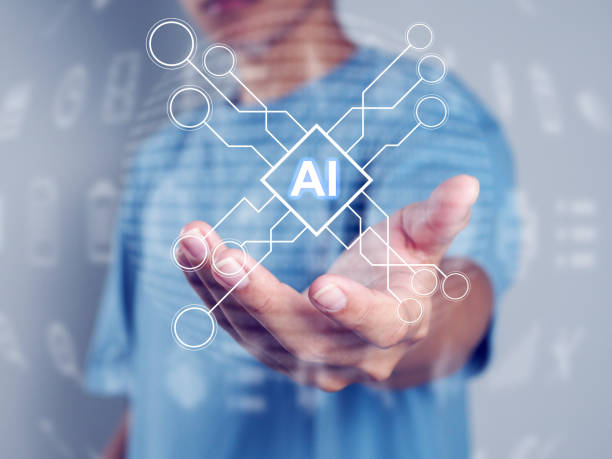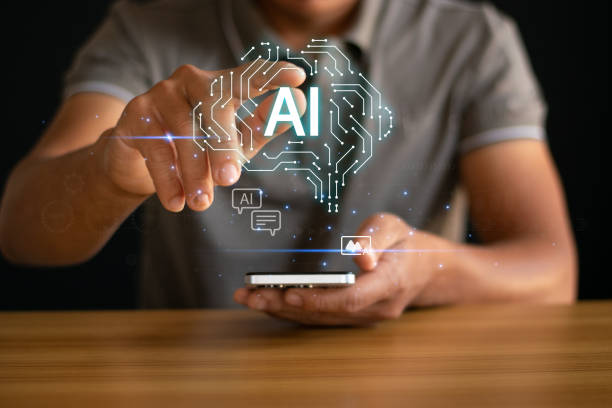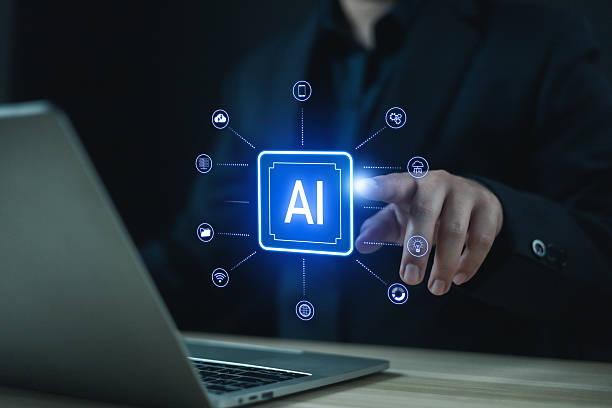What is Artificial Intelligence? Basic Definitions and Concepts

#Artificial_Intelligence or AI generally refers to the ability of a computer system to mimic human cognitive functions such as learning, problem-solving, decision-making, and understanding natural language.
In other words, artificial intelligence tries to enable machines to do things that usually require human intelligence.
This field includes a wide range of techniques and approaches, including machine learning, neural networks, natural language processing, and computer vision.
The ultimate goal of artificial intelligence is to build systems that can operate independently and intelligently.
Artificial intelligence can be divided into two main categories: Narrow AI, which is designed to perform specific tasks, such as facial recognition or language translation, and General AI, which has the ability to do anything a human can do.
Most current AI systems are of the narrow AI type.
To better understand artificial intelligence, we need to be familiar with basic concepts such as algorithms, data, and learning models.
Algorithms are a set of instructions that tell a computer how to perform a task.
Data is the information that algorithms use to learn and improve their performance.
Learning models are mathematical patterns that use data to make predictions or decisions.
Research shows that 80% of customers trust companies with professional websites more. Does your current website earn this trust?
With Rasaweb’s corporate website design services, solve the problem of customer distrust and poor online image forever!
✅ Create a professional image and increase customer trust
✅ Attract more sales leads and grow your business
⚡ Get free consultation
Types of Artificial Intelligence Approaches and Applications

Artificial intelligence has different types, each with its own approaches and applications.
One common classification is to divide artificial intelligence into three main types:
- Narrow AI This type of artificial intelligence is designed to perform specific tasks and performs very well in doing that task.
Examples of narrow AI include: facial recognition systems, search engines, and recommender systems. - General AI This type of artificial intelligence has the ability to do anything a human can do.
General AI is still under development and has not yet been fully realized. - Super AI This type of artificial intelligence surpasses human intelligence and can solve problems that humans cannot solve.
Super AI is still a theoretical concept and does not exist.
Artificial intelligence has widespread applications in various industries.
In healthcare, artificial intelligence is used to diagnose diseases, develop drugs, and provide personalized care.
In the financial industry, artificial intelligence is used to detect fraud, manage risk, and provide customer service.
In the transportation industry, artificial intelligence is used to develop self-driving cars and optimize routes.
Machine Learning: The Backbone of Artificial Intelligence

Machine Learning is one of the most important subsets of artificial intelligence that allows machines to learn from data without explicit programming.
In other words, machine learning allows computers to identify patterns by analyzing data and make predictions or decisions based on them.
Machine learning is divided into three main categories:
- Supervised Learning In this type of learning, the machine is given labeled data, and the machine learns to associate between data and labels.
Examples of supervised learning include: image recognition and stock price prediction. - Unsupervised Learning In this type of learning, the machine is given unlabeled data, and the machine learns to identify patterns in the data.
Examples of unsupervised learning include: customer clustering and data dimensionality reduction. - Reinforcement Learning In this type of learning, the machine learns by interacting with its environment.
The machine learns which actions lead to more rewards by performing various actions and receiving rewards or penalties.
Examples of reinforcement learning include: playing games and controlling robots.
Machine learning plays a very important role in the development of artificial intelligence systems.
Machine learning algorithms allow machines to identify patterns by analyzing data and make predictions or decisions based on them.
| Learning Type | Description | Example |
|---|---|---|
| Supervised Learning | Learning from labeled data | Image recognition |
| Unsupervised Learning | Learning from unlabeled data | Customer clustering |
| Reinforcement Learning | Learning through interaction with the environment | Playing games |
Neural Networks: Inspired by the Human Brain

Neural Networks are computational models that are inspired by the structure and function of the human brain.
A neural network consists of a large number of nodes (neurons) that are connected to each other.
Each connection between neurons has a weight that represents the strength of the connection.
Neurons receive inputs, process them, and produce an output.
The output of one neuron is used as input for other neurons.
Neural networks are used to solve various problems such as image recognition, natural language processing, and time series prediction.
Neural networks perform well especially in cases where the data is complex and nonlinear.
There are different types of neural networks, including Feedforward Neural Networks, Recurrent Neural Networks, and Convolutional Neural Networks.
Each type of neural network is suitable for solving specific problems.
Neural networks are one of the most powerful tools of artificial intelligence.
These networks can learn complex patterns in data and make predictions or decisions based on them.
TensorFlow is one of the popular libraries for building and training neural networks.
Are you disappointed with the low conversion rate of your online store? Rasaweb turns your online store into a powerful tool for attracting and converting customers!
✅ Significant increase in visitor-to-buyer conversion rate
✅ Unparalleled user experience to increase customer satisfaction and loyalty⚡ Get a free consultation from Rasaweb!
Natural Language Processing (NLP): Understanding and Generating Language by Machine

Natural Language Processing or NLP is a branch of artificial intelligence that allows machines to understand and generate human language.
NLP includes a wide range of tasks, including language translation, text summarization, sentiment analysis, and answering questions.
NLP uses various techniques such as machine learning, statistics, and linguistics to process human language.
NLP algorithms can analyze the structure and meaning of language and perform various tasks based on it.
NLP has widespread applications in various industries.
In customer service, NLP is used to answer customer questions, provide support, and solve problems.
In marketing, NLP is used to analyze customer sentiment, identify market trends, and deliver targeted advertising.
In healthcare, NLP is used to extract information from medical records and provide diagnosis and treatment.
Open-source tools like spaCy and NLTK help developers easily create NLP applications.
Computer Vision: Seeing and Interpreting Images by Computer

Computer Vision is a branch of artificial intelligence that allows computers to see and interpret images.
Computer vision includes a wide range of tasks, including object detection, face recognition, motion detection, and 3D reconstruction.
Computer vision uses various techniques such as machine learning, statistics, and geometry to process images.
Computer vision algorithms can identify patterns in images and perform various tasks based on it.
Computer vision has widespread applications in various industries.
In the automotive industry, computer vision is used to develop self-driving cars and driver assistance systems.
In the manufacturing industry, computer vision is used to inspect product quality and automate processes.
In healthcare, computer vision is used to diagnose diseases and assist in surgery.
With the advancement of artificial intelligence and the development of deep learning algorithms, the accuracy and efficiency of computer vision systems has increased dramatically.
Practical Applications of Artificial Intelligence in Everyday Life

Artificial intelligence is no longer an abstract concept and is currently present in many aspects of our daily lives.
From online recommender systems to self-driving cars, artificial intelligence is increasingly changing the way we live and work.
Some practical applications of artificial intelligence in everyday life include:
- Recommender Systems Recommender systems use artificial intelligence to suggest products, movies, and music to users.
These systems can provide personalized suggestions by analyzing data about users’ tastes and behavior. - Voice Assistants Voice assistants such as Google Assistant and Siri use artificial intelligence to understand and respond to users’ voice commands.
These assistants can perform various tasks such as setting reminders, playing music, and sending messages. - Self-Driving Cars Self-driving cars use artificial intelligence to drive without the need for human intervention.
These cars understand their surroundings using sensors and cameras and make decisions using artificial intelligence algorithms. - Fraud Detection Fraud detection systems use artificial intelligence to identify suspicious transactions and prevent fraud.
These systems can identify unusual patterns by analyzing data about transactions.
| Area | Application |
|---|---|
| E-commerce | Product recommendation systems |
| Personal Assistants | Answering questions and executing voice commands |
| Transportation | Self-driving cars |
| Finance | Fraud detection |
Advantages and Disadvantages of Artificial Intelligence Comprehensive Analysis

Artificial intelligence has many advantages and disadvantages.
On the one hand, artificial intelligence can help improve efficiency, reduce costs, and solve complex problems.
On the other hand, artificial intelligence can lead to job loss, increased inequality, and the creation of new ethical issues.
Advantages of Artificial Intelligence
- Increased Efficiency Artificial intelligence can automate processes and perform tasks faster and more accurately.
- Cost Reduction Artificial intelligence can reduce labor and operating costs.
- Solving Complex Problems Artificial intelligence can solve complex problems that are difficult or impossible for humans.
- Improved Decision Making Artificial intelligence can help humans make better decisions by analyzing data.
Disadvantages of Artificial Intelligence
- Job Loss Artificial intelligence can lead to job loss in some industries.
- Increased Inequality Artificial intelligence can increase economic inequality by concentrating wealth and power in the hands of a few.
- Ethical Issues Artificial intelligence can create new ethical issues, such as accountability for decisions made by artificial intelligence systems.
To maximize the benefits and minimize the disadvantages of artificial intelligence, we must use it responsibly and ethically.
We need to create policies and regulations that protect human rights and interests against the potential dangers of artificial intelligence.
Did you know that 85% of customers check your company’s website before any interaction?
Build a corporate website that deserves your credibility with Rasaweb.
✅ Increase customer credibility and trust
✅ Attract high-quality leads
⚡ Get a free website design consultation
The Future of Artificial Intelligence Opportunities and Challenges

The future of artificial intelligence is bright and full of opportunities.
As technology advances, artificial intelligence will be able to do more and improve our lives in many ways.
However, the future of artificial intelligence also brings challenges.
We need to prepare for these challenges and create policies and regulations that protect human rights and interests against the potential dangers of artificial intelligence.
Some of the future opportunities of artificial intelligence include:
- Improving Healthcare Artificial intelligence can help diagnose diseases, develop drugs, and provide personalized care.
- Increasing Productivity Artificial intelligence can automate processes and perform tasks faster and more accurately.
- Creating New Jobs Artificial intelligence can create new jobs in the development, deployment, and maintenance of artificial intelligence systems.
- Solving Global Problems Artificial intelligence can help solve global problems such as climate change, poverty, and hunger.
Some of the future challenges of artificial intelligence include:
- Job Loss Artificial intelligence can lead to job loss in some industries.
- Increased Inequality Artificial intelligence can increase economic inequality by concentrating wealth and power in the hands of a few.
- Ethical Issues Artificial intelligence can create new ethical issues, such as accountability for decisions made by artificial intelligence systems.
To maximize the opportunities and minimize the challenges of artificial intelligence, we must use it responsibly and ethically.
How to Learn Artificial Intelligence Educational Paths and Resources

Learning artificial intelligence can be an exciting and rewarding journey.
Given the growing demand for artificial intelligence professionals, learning this skill can provide excellent career opportunities.
Fortunately, there are various educational resources for learning artificial intelligence, including online courses, books, tutorials, and online communities.
Some of the educational paths and resources for learning artificial intelligence include:
- Online Courses Websites like Coursera, edX, and Udacity offer numerous online courses in artificial intelligence.
These courses are usually taught by university professors and industry experts. - Books There are many books on artificial intelligence that cover basic and advanced concepts.
Some popular books in this field include “Artificial Intelligence A Modern Approach” and “Deep Learning”. - Tutorials There are numerous online tutorials in the field of artificial intelligence that help you gain practical skills in the field of artificial intelligence.
Websites like YouTube and Medium offer many free tutorials in this field. - Online Communities Online communities like Stack Overflow and Reddit are good places to ask questions, share knowledge, and learn from others.
To start learning artificial intelligence, it is recommended to first become familiar with basic concepts such as mathematics, statistics, and programming.
Then you can start learning machine learning algorithms and artificial intelligence techniques.
With practice and repetition, you can improve your skills in the field of artificial intelligence.
Frequently Asked Questions
| Question | Answer |
|---|---|
| 1. What is Artificial Intelligence (AI)? | It is a branch of computer science that aims to create machines capable of simulating human intelligence and performing tasks that require human thinking, such as learning, problem-solving, and decision-making. |
| 2. What are the main types of Artificial Intelligence? | It can be classified into Narrow AI, which focuses on a specific task, General AI, which possesses comprehensive human capabilities, and Super AI, which surpasses human intelligence. |
| 3. Mention some common Artificial Intelligence applications in our daily lives. | These include voice assistants (such as Siri and Alexa), recommendation systems (such as Netflix and Amazon), self-driving cars, facial recognition systems, and spam filters. |
| 4. What is the difference between Artificial Intelligence and Machine Learning? | Artificial Intelligence is the broader concept of creating intelligent machines, while Machine Learning is a subset of Artificial Intelligence that focuses on enabling systems to learn from data without explicit programming. |
| 5. What is Deep Learning? | It is a subset of Machine Learning that uses multi-layered artificial neural networks (deep neural networks) to process data and discover complex patterns, and it is used in image and speech recognition. |
| 6. What are the most prominent benefits of Artificial Intelligence? | Improving efficiency and productivity, automating repetitive tasks, making better decisions based on analyzing big data, and developing solutions to complex problems in fields such as medicine and science. |
| 7. What are the main challenges facing the development and deployment of Artificial Intelligence? | These include the need for vast amounts of high-quality data, privacy and security issues, bias in data and algorithms, and high development and maintenance costs. |
| 8. Does Artificial Intelligence raise ethical or social concerns? | Yes, it raises concerns regarding privacy, algorithmic bias, job losses due to automation, and responsibility for errors made by intelligent systems, and the need for a regulatory framework. |
| 9. How can Artificial Intelligence affect the future of the job market? | It can lead to the automation of some routine tasks, but it will also create new jobs that require advanced skills in developing, operating, and maintaining Artificial Intelligence systems. |
| 10. What are some modern or promising technologies in the field of Artificial Intelligence? | These include advanced Natural Language Processing (NLP) (such as large language models like ChatGPT), computer vision, robotics, and Generative AI. |
And other services of Rasa Web Advertising Agency in the field of advertising
Intelligent Marketplace: Designed for businesses looking to grow online through intelligent data analysis.
Intelligent Digital Branding: A fast and efficient solution to increase site visits by focusing on attractive UI design.
Intelligent Digital Branding: Designed for businesses looking to engage users through attractive UI design.
Intelligent Google Ads: A professional solution for attracting customers with a focus on precise audience targeting.
Intelligent Google Ads: Professional optimization to increase sales using intelligent data analysis.
And over a hundred other services in the field of internet advertising, advertising consulting and organizational solutions
Internet Advertising | Advertising Strategy | Advertorial Report
Sources
What are the applications of artificial intelligence and how do they work?
,What is artificial intelligence and how does it work? The most common use of artificial intelligence for business in 2023
,What is artificial intelligence, its applications and types
,What is artificial intelligence and what are its applications?
Are you ready to transform your business in the digital world?
Rasaweb Afarin Digital Marketing Agency, with years of experience in providing innovative and creative solutions, helps you have a powerful and effective presence in the online space and achieve your marketing goals.
We are your strategic partner in the field of secure website design and professional website design, search engine optimization (SEO), social media management, and running targeted advertising campaigns to accelerate your business growth.
For a free consultation and to learn more about our comprehensive services, contact Rasaweb Afarin today and create a bright future for your brand.
📍 Tehran, Mirdamad Street, next to the Central Bank, South Kazerun Alley, Ramin Alley No. 6




